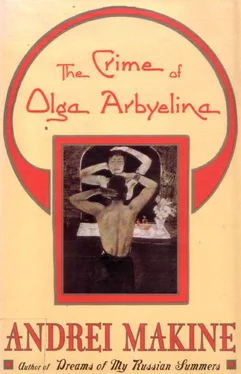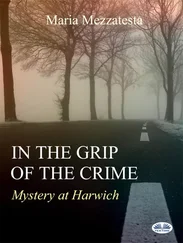She regained consciousness several seconds later. Got up, feeling a strange heaviness in her movements, saw reflected in the mirror a long scratch filling with blood that traced a fine curve from her cheekbone to the corner of her mouth. Taking confused, dull steps, she stood a small round table upright that had been knocked over, picked up a little ceramic vase that had lost its handle but was not broken… While she did this she was living intensely elsewhere. She was walking into a great wooden mansion, a great silent house surrounded by snow-laden trees. She walked along corridors, whose walls were crowded with portraits that followed her with suspicious looks; and slipped into a tiny room tucked away on the top floor… There at a narrow window decorated with hoarfrost patterns she forgets herself for a long time. She, the growing girl, who is elated to the point of giddiness by these crystal flowers and fronds. Bringing her lips close to the windowpane she blows lightly. Through the little melted hole she sees a forest burdened with snow as far as the eye can see…
Without detaching her eyes from that moment, she wiped the blood from her cheek; chopped some wood; prepared the meal and later spoke to the people at the library; lived other nights and other days. Her gaze forever focused on the endless forest in the snow. She no longer remembered having lived any other way.
The doctor, as ever, said little, but after long weeks of solitude these few sentences seemed to her like an elaborate, almost overwhelming speech. Nor was she listening to him properly. It was an old habit of hers: the doctor's observations caused pages to appear in her memory with the description of the illness, the symptoms, and the treatments, pages she knew right down to the very arrangement of paragraphs. The doctor spoke as he wrote out the prescription, breaking off to reread it, and it was into these pauses that fragments of the pages learned by heart would insert themselves: "… the softened bone began to cavitate; small pockets of dead tissue formed cysts. The bony extremities became deformed, and adopted unaccustomed postures. The joint gave rise to a progressive chronic disability…
There was nothing new to her either in what she was hearing or in the trains of thought unfolding in her mind. She could not stop herself following through these prognoses to the limit; first picturing the worst case, then the cure; the two extremes, despair and a miracle. All parents of sick children, she already knew, came to terms with their distress in this way.
The lamp on the desk flickered. In a brief moment of darkness she saw the pale ghost, her son, still half undressed, tugging at the inside-out sleeve of his shirt. And outside the window waves of drifting snow clung to the panes… The light returned, the doctor finished writing and, in his voice that always sounded as if he were irritated by incomprehension, reached his conclusion: they would have to think of an operation. "This summer, so as not to make him miss his academic year," he added in a less dry tone, turning toward the boy… The lamp went out again, they spent several moments in silence, gradually growing accustomed to the soporific blue of the night-light above the door. In the corridor cries could be heard and the drumming of footsteps.
This wait in the darkness was salutary. All morning Paris had assaulted them with too many words, too many objects, too much gesticulation. And even in this office she had suffered from the same excess: sheets of paper, files; pens, the paper knife; the doctor's voice that had to be decoded; his apparently indifferent glances, in which, nevertheless, she saw herself perceived as a woman obliged to please… The minutes they spent in the half light eradicated the brutal superabundance of sensations. They could hear flurries of snow being hurled against the windowpanes, and somewhere in the depths of the city the muffled hoot of a siren… The doctor grumbled and struck a match. The light of an oil lamp shone. They said good-bye but he chose to accompany them to the exit; that wait in the darkness had brought them closer together… As he walked beside her in the ill-lit corridor, he felt obliged to speak and uttered a sentence that was clearly meaningless but which crucified her. It was one of those very French turns of phrase that mislead foreigners with their disconcerting thoughtlessness. "At this stage in the game, you know," he sighed, "it's best to take each day as it comes." There was a note of melancholy, almost of tenderness in his voice. He abandoned the caution reflected in his customary tone, dry and feigning irritation. "In which case," he added, in an already neutral voice, as he opened the door for them, "sufficient unto the day is the evil thereof." He must have sensed himself that his remark was double-edged.
The whole of Paris was plunged in darkness. Only the car headlights cut through the whirling clouds of snow. They crossed the Seine on a ghostly bridge, whose gigantic steel curves seemed to sway in time with the surging of the snow squalls. In one street, hemmed in between blind houses, a small gathering was gesticulating around a woman who lay on the trodden snow. A little farther on, a bus was unable to get started, the acid air flayed the nostrils and blocked the throat; then a fresh gust of wind swept them clean. It was at this point, trying to escape the asphyxiating cacophony of the cars, that she mistook the road. Instead of emerging onto the avenue that would have led them straight to Li's house, they came upon a monotonous, endless wall. Should they go right? Left? What she wanted most of all was to turn her back on the squalls. From the other side of the enclosure repulsive, sickly sweet effluvia wafted over; in calmer weather, no doubt, these stagnated within the walls of the abattoir… They walked along, often slipping, catching hold of each other's arms. She raised her brow into the snow, as if to drive out the sentence that was absurdly matching the rhythm of her footsteps: "At-this-stage-in-the-game-at-this-stage-in-the-game…"
Suddenly in the darkness lashed with squalls a cry arose quite inhuman in its power, a bellow torn from the entrails of an animal, a maddened and tragic call. She shivered, quickened her step, stumbled. He grasped her elbow, supported her as she almost fell. Their faces came so close that she could see the slight trembling of his lips and heard his voice despite the wind's fury: "Don't be afraid…"
She gazed into his eyes and asked, in total unawareness, simply echoing his voice, "Afraid of what…?"
"Of anything," he replied and they continued walking.
Li went off to sleep in her studio, leaving them in the tiny sitting room crammed not only with furniture but also, a recent addition, cardboard boxes and cases, in preparation for her departure.
They were alone: she, bedded down on the little sofa, whose curve she had to mold herself to in order to sleep; he on the armchairs pushed together, squeezed between the piano and the table… They could not sleep and both sensed this, sensed the discreet wakefulness of the other in the darkness… Finally she recognized breathing that was no longer careful of the other's presence, the inimitable syncopated, touching music of a sleeper's respiration. She turned over onto her back, prepared for long sleepless hours, happy, even, with the strangeness of this place, where conjuring up the impressions that had assailed her could pass for an insomniac's game… By reaching out her arm she could have touched the armchairs in which her son was asleep. This dark apartment in a great dark, deserted city; the two of them, so near to each other, with this unique, unspeakable, monstrous bond between them… The night began to ring in her ears. She moved, reached out with her hand, grasped a box of matches, held the flame close to her watch. It was half past four in the morning. She got up and put on her clothes; this action already felt like a welcome prelude to their escape. The water in the tiny bathroom was icy, like in an abandoned house; the minor domestic disorder in the kitchen also heralded preparations for departure. She opened the door at the back that looked onto the little yard. The snowstorm had abated. The last flakes drifted down slowly, attracted by the light of the candle. The snow was smooth, virgin, even the birds had not yet had time to star it with their footprints. In their garments of white the walls, cornices, and chimney pots had a fluid, downy beauty…
Читать дальше












